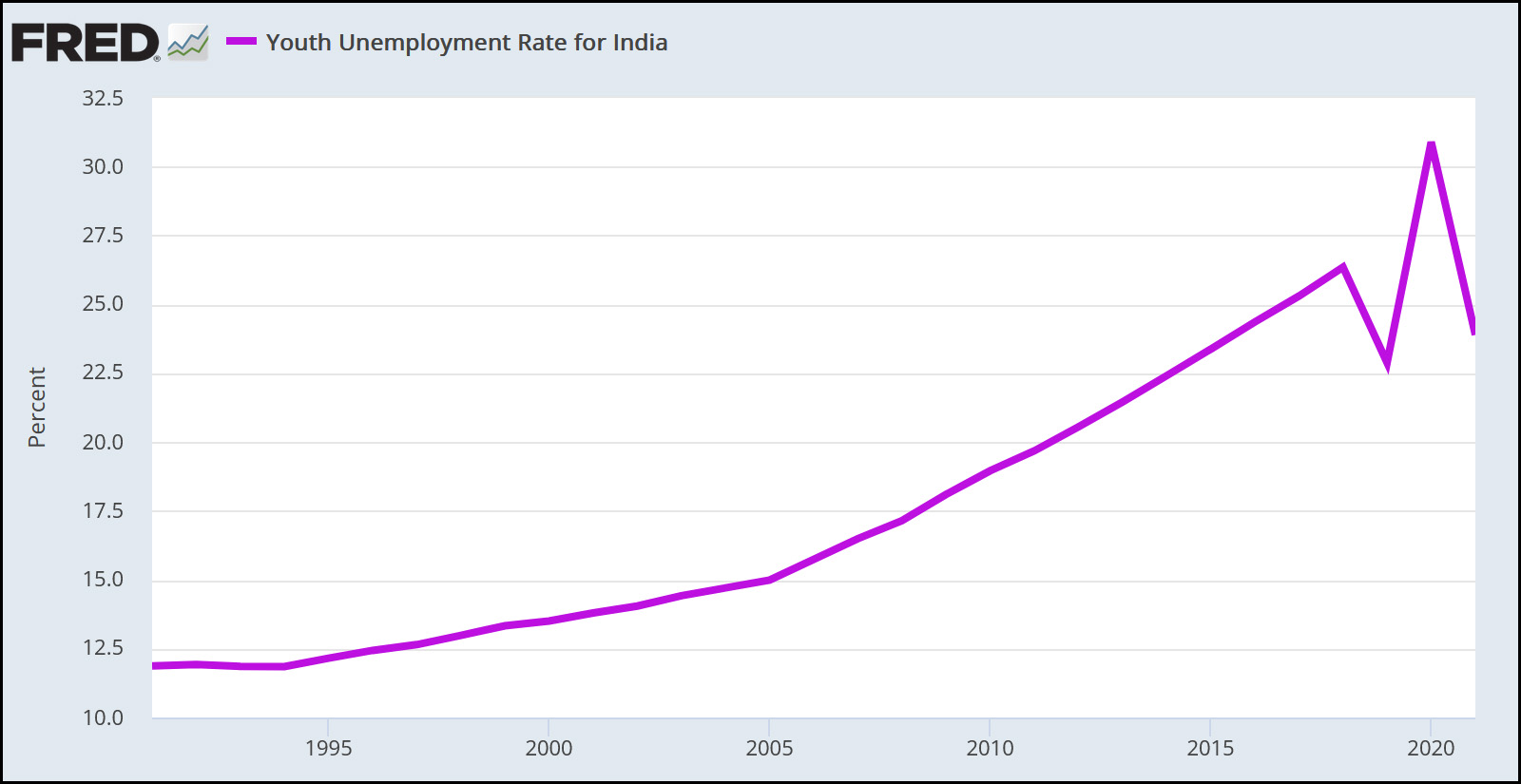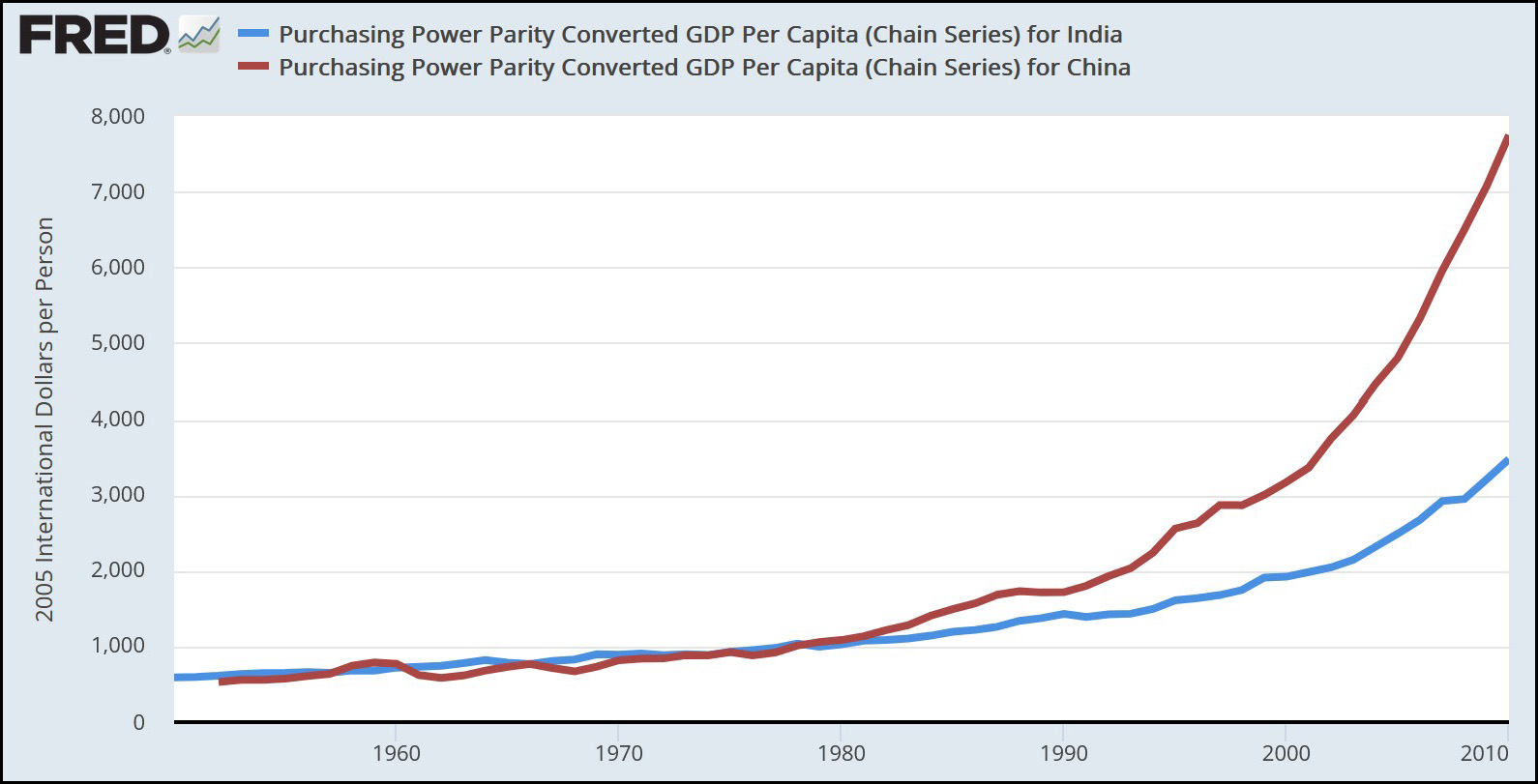India has officially surpassed China as the most populous nation on the planet. This is a bad thing, not a good one, and hardly the only problem India has. Here's one of the biggest:
 As a point of comparison, this number is around 10% for the United States. India's rate of labor participation is also low in general, which is one of the reasons for this:
As a point of comparison, this number is around 10% for the United States. India's rate of labor participation is also low in general, which is one of the reasons for this:
 India's per capita GDP rose at about the same rate as China's up through 1980. After that, however, it lagged far behind. This chart goes only through 2010, but the numbers for 2022 are about $14,000 for China vs. $5,000 for India (compared to $80,000 for the US). In absolute terms India has enjoyed strong growth, but nowhere near enough to make it an economic giant like China.
India's per capita GDP rose at about the same rate as China's up through 1980. After that, however, it lagged far behind. This chart goes only through 2010, but the numbers for 2022 are about $14,000 for China vs. $5,000 for India (compared to $80,000 for the US). In absolute terms India has enjoyed strong growth, but nowhere near enough to make it an economic giant like China.

When comparing India to China, on the population and economic perimeters, there is an important difference. China has an aging demographic challenge: population age is not nearly the problem for India.
Average age in China is 38.4 versus 28.5 for India. In part because of the one child policy, looking forward, China is projected to have a rapidly aging population.
if you already have way too many people, maybe a younger population is actually a bad thing.
Who supports the old people when there aren't any young people?
i guess they better start saving! i don't see how having a bunch of unemployed young people is gonna help them much.
Populate your way to prosperity ? Maybe. OTOH, it doesn't appear to be working in Sub Saharan Africa.
The math is unavoidable. A growing population will average young; the higher the growth rate, the younger the population. A stable population will average older. A shrinking population will average older yet. When a country is making the transition from a growing population to a stable or shrinking population, you will see an aging population. The only exceptions is if the population size is growing/shrinking because of immigration/emigration rather than because of domestic birth/death rates. This is because immigrants do not arrive in the country at age zero and so do not necessarily pull the average age down.
If you're going by the UN report, your reporting source got it wrong.
The chart has notes. The note specifies: "Total population: Estimated size of national populations at mid-year".
It's important to note that India has not conducted a census in over a decade and China has likely overcounted its population for a handful of reasons, not the least of which, is a failure of accounting of the deaths from COVID.
This is a meaningless milestone.
I mean, what are you going to do about it? Curtail reproductive freedom like China did? Shift trade from China to India to get it to move faster into industrialization then post-industrialization into services industry?
Wait, that second idea might be a win-win for everyone (except of course, China); let's do that.
"Shift trade from China to India"
This is already happening, as well as to Viet Nam, Thailand and other places, mostly due to China's recent turn towards aggressiveness and intransigence.
Back when Trump started tariff wars, I asked a friend what the company she worked at was doing about it. She said they were shifting from China to Vietnam.
It's true that the question of whether India's population is slightly larger or slightly smaller than China's is pretty unimportant. However, China has been the world's most populous country for a LONG time. The fact that it either has been or is about to be bumped down to second place is of sufficient interest just as a historical curiosity to be worthy of a small amount of notice.
Right. Two sentence post, as follows:
India is about to surpass China as the most-populous nation, according to the UN. Neither is especially democratic, but according to some, size matters over quality.
India doesn't have to "curtail reproductive freedom," because Indians themselves have already lowered the country's birthrate substantially over the past two decades.
That's classic demographic transition.
Usually, when the supply of people overtakes the supply of food, the people make some kind of correction to bring the supply of food up, or the supply of people down.
Mao instituted the one-child policy because China was already producing about as many calories as it could, and he didn't want to import food from the US.
Rwanda and Burundi also periodically hit the population/food limit.
The question is, which choice will India make?
Mao didn't institute the one-child policy; he encouraged population growth because he thought being a "population superpower" would help balance the advantages the USSR and USA held in military technology.
Mao died in September of 1976. The one-child policy began three years later, under Deng Xioaping.
I suspect the youth unemployment rate is not that high. A lot of Indians work in the "informal" economy, so never get counted.
Kevin, I'm sure I speak for many on here when I say....Don't you have other really important things going on right now!? I appreciate the graphs but sheez, you might have a problem.
Be well~
i think he probably scheduled these posts in advance
I've occasionally seen comments like yours in reference to Kevin's cancer treatments. But perhaps he, you know, enjoys blogging and finds it relaxing.
Fair points, he obviously loves it.
India has officially surpassed China as the most populous nation on the planet. This is a bad thing, not a good one...
Bad thing? Not so sure about that. India's rate of population growth has slowed down dramatically, like just about every place else on earth. It just hasn't slowed down as much as China's. Also, in terms of long term geopolitical balance, I rather think diminished PRC relative influence might be good (Modi is hardly a small-d democrat, but he's no Xi Jinping, either). A huge population isn't the only factor determining geopolitical heft, mind you; but it's also not nothing. The position of the US and the West vis-a-vis China would surely be a lot weaker right now if the latter didn't have such an increasingly formidable power to deal with on its southern doorstep.
In absolute terms India has enjoyed strong growth, but nowhere near enough to make it an economic giant like China.
I think Kevin should have written nowhere "long enough." The differential between Indian and Chinese growth rates is pretty heavily in favor of the former now, and has been for the last 5-7 years. India is obviously a lot poorer than the PRC (much of eastern China is now nearly as wealthy as the lower rung of the EU). But just not enough of those years have accumulated. But India should continue to relentlessly narrow the gap between itself and China both in per capita and (more rapidly) aggregate terms as the years go by, especially now that the latter appears to be on the precipice of plunging to rich country (ie, 2%) growth levels (long before it's truly rich, of course).
Decades ago India promoted population growth. There was a slogan, "With a billion people we can do anything". Now they've got it.
Okay dudes. Live with it. Don't want to hear any complaints about whatever trouble you get in.
I don't think that was India. They've been trying to rein in population growth since at least 1970, when they declared a "population state of emergency." Hell, they established a national family planning policy in 1952!!
China, on the other hand, promoted population growth right up until the end of the Cultural Revolution.
I would quibble with the headline. India may be the most populous country on Earth. Russia remains the biggest.
This is the culture that gave us the Kama Sutra. It makes perfect sense that they would have the largest population.
I read a paper that argued that economic growth was a partial result of unwiding Asian patriarcy. China dismantled more of its traditional patriarchy than India did so it reaped the benefits.
That was a big promise of the Communists before they came to power, and they worked to promote women in the workforce from the early 1950s on, but that didn't lead to any real economic growth for a quarter of a century. China was probably at least as patriarchal (probably more so) under Deng Xiaoping as under Mao Zedong, but it was only under the former that economic growth really took off.
Patriarchy is one thing but India's deep cultural chauvinism has got to be a major hindrance. The caste system and hindu-muslim antagonism probably restrict nearly all aspects of commerce.